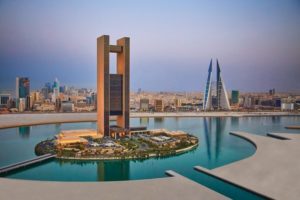

The Bahrain Economic Development Board (EDB) says investment in Bahrain’s tourism infrastructure has now reached over $13bn.
The total covers 14 prominent projects that will further boost growth in the kingdom’s tourism and leisure sector.
The projects are part of Bahrain’s large-scale infrastructure development across a wide range of sectors and are valued at over $32bn. This public-private sector investment consists of $10bn of government funding, $7.5bn under the GCC Development Fund, and $15bn worth of investment in the private sector.
New five and four-star hotels and resorts are being built to cater to current and future demand. Supporting these developments, Bahrain International Airport is undergoing a $1.1bn upgrade that will increase passenger capacity from nine to 14 million a-year by 2020.
Other infrastructure investment projects include the development of a number of shopping malls such as Dilmunia Mall and the Marassi Galleria shopping complex, to join the recently-opened $159m Avenues Mall at Bahrain Bay.
Bahrain’s tourism strategy also includes medical-tourism projects through King Abdullah Medical City, and mixed-use real estate projects such as Bahrain Bay, Bahrain Marina, Diyar al-Muharraq, Water Garden City, Dilmunia, and Marassi al-Bahrain where Emaar Hospitality brands such as The Address Hotel and Vida are under construction.
The total number of tourists visiting Bahrain increased by 12.8 per cent in the first nine months of 2017. The total number of tourists visiting the kingdom reached 8.7 million during the first nine months of this year. The tourism sector contributes 6.3 per cent to Bahrain’s GDP.
Bahrain’s real economic growth reached an annual pace of 3.4 per cent for the first half of this year, which is an improvement on the 3.2 per cent achieved during 2016 as a whole.
Non-oil GDP growth performed more strongly and quickened during the first half of this year to 4.7 per cent, from 4 per cent for the whole of 2016.
The EDB says the non-oil growth was almost entirely due to activity in the private sector, underscoring the strength of structural and counter-cyclical growth drivers in the Bahraini economy.
You might also like...

Iraq oil project reaches 70% completion
26 April 2024

Samana announces $272m Dubai Lake Views project
26 April 2024

Iraq signs deal to develop the Akkas gas field
25 April 2024

Emaar appoints beachfront project contractor
25 April 2024
A MEED Subscription...
Subscribe or upgrade your current MEED.com package to support your strategic planning with the MENA region’s best source of business information. Proceed to our online shop below to find out more about the features in each package.




